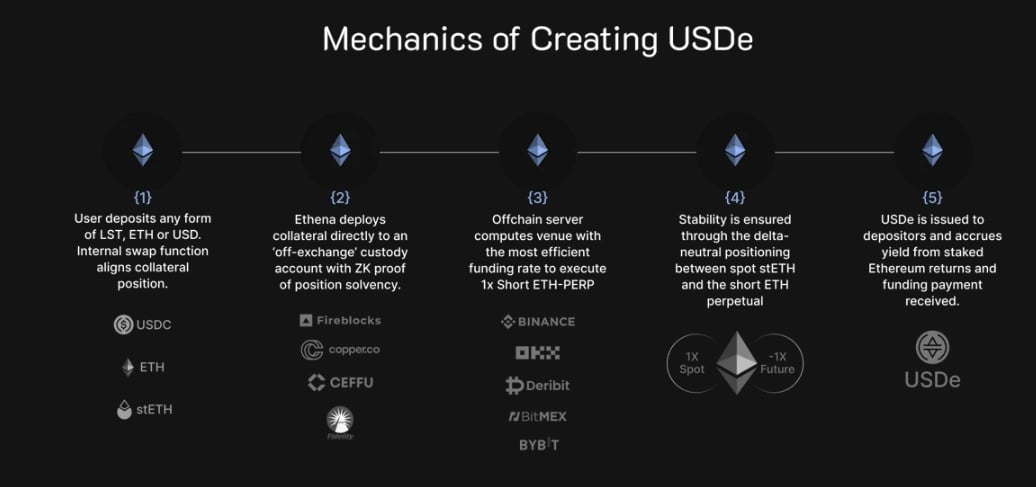위키 구독하기
Share wiki
Bookmark
Ethena USDe
0%
Ethena USDe
Ethena USDe('인터넷 채권'으로 라벨링됨)는 ETH 스테이킹 수익률과 영구 스왑으로 구동되는 완전 담보 온체인 스테이블 코인입니다. USDe의 발행 및 상환은 Ethena Labs에서 관리합니다. [2]
개요
USDe는 Lido의 stETH와 같은 ETH LST에 의해 1:1로 담보화되며, 이 노출은 ETH의 동일한 양을 숏 포지션으로 유지하여 영구 선물로 헤지됩니다. 이는 높은 수익률을 생성하므로 USDe는 '인터넷 채권'으로 라벨링됩니다. [3]
Ethena 설립자인 Guy Young에 따르면 USDe는 스테이블 코인이 기본 자산에 대한 페그를 유지할 수 없고, 탈중앙화될 수 없으며, 확장 가능할 수 없다는 스테이블 코인 트릴레마를 해결하기 위해 개발되었습니다. [3]
“제품에 대한 철학은 기본 레이어에서 가능한 한 안전하고 안전하게 만드는 것입니다. 어떤 면에서는 수익률을 높이기 위해 레버리지를 사용하여 시작할 수 있는 흥미로운 것들이 있지만, 우리는 다른 사람들이 가서 구축하고 돈 시장이나 perp dexs에서 레버리지를 다른 흥미로운 방식으로 사용하기 시작할 수 있는 견고한 기반을 만들고 싶습니다.” - [Guy Young] - (https://iq.wiki/wiki/guy-young) [3]
사용자는 허가 없는 외부 유동성 풀에서 USDe를 획득할 수 있으며, KYC/KYB 심사를 통과한 허가된 관할 구역의 승인된 당사자는 시장 조성 기관에만 제공되는 Ethena Labs 계약을 통해 주문형으로 USDe를 발행하고 상환할 수 있습니다. 암호화폐 시스템 내에 저장된 신뢰할 수 없는 담보를 통해 기존 은행 인프라에 의존하지 않고 USDe가 항상 사용자 예금으로 완전히 뒷받침되도록 보장합니다. 또한 사용자는 Ethena에서 USDe를 발행 및 상환하고 Binance 또는 Curve 풀과 같은 외부 시장에서 거래하여 가격 불균형을 포착하여 교차 시장 차익 거래에 참여할 수 있습니다. [2]
“우리는 암호화폐에서 가장 중요한 도구인 스테이블 코인을 은행 시스템과 분리하고 싶습니다. 우리가 하려는 모든 것의 요점은 자급 자족 시스템을 만드는 것이지만 가장 중요한 자산은 완전히 중앙 집중화되어 있습니다.” - Ethena의 핵심 논제에 대한 Guy[3]
USDe 가격 안정성 메커니즘
USDe는 기본 담보 자산과 관련하여 자동화되고 프로그래밍 가능한 델타 중립 헤지를 실행하여 페그 안정성을 얻습니다. 동일한 크기로 담보 자산의 가격 변동 위험을 헤지하면 담보 자산 가치의 변동이 헤지 레그 가치의 변동으로 상쇄됩니다. 이를 통해 담보의 합성 USD 가치가 모든 시장 상황에서 비교적 안정적으로 유지됩니다. [2]
USDe 생성 메커니즘
USDe는 사용자가 LST, ETH 또는 USD를 입금하여 생성됩니다. 내부 스왑 기능은 담보 포지션과 조화를 이룹니다. 그 후 Ethena는 담보를 장외 보관 계정으로 보내 ZK 증명을 제공합니다. 장외 서버는 가장 효율적인 자금 조달 금리를 가진 장소를 계산하여 1x 숏 ETH-PERP를 실행합니다. 안정성은 스팟 stETH와 숏 ETH 영구 간의 델타 중립 포지셔닝을 통해 보장됩니다. [4]
예금자는 스테이킹된 이더리움 수익과 수령한 자금 조달 지불금에서 수익을 축적하는 발행된 USDe를 받습니다. 이 프로세스는 Ethena 생태계 내에서 USDe를 생성하고 유지하기 위한 투명하고 안전한 메커니즘을 보장합니다. 확장성은 스테이킹된 ETH 담보가 동일한 명목 금액의 숏 포지션으로 완벽하게 헤지될 수 있으므로 상당한 과잉 담보 없이 USDe를 확장할 수 있는 파생 상품을 활용하여 달성됩니다. 스테이블 코인은 1:1 담보만 필요합니다. [4]
안정성은 발행 시 담보에 대해 실행되는 레버리지 없는 숏 영구 포지션을 통해 제공되어 포지션이 델타 중립이고 USDe가 초기 명목 잔액이 완벽하게 헤지되지 않은 사용자에게 발행되지 않도록 보장합니다. 검열 저항은 담보를 은행 시스템에서 분리하고 중앙 집중식 유동성 장소 외부의 신뢰할 수 없는 암호화폐 담보를 온체인, 투명하고, 연중무휴 감사가 가능한 프로그래밍 방식의 보관 계정 솔루션에 저장하여 달성됩니다. [4]

기술
생성된 수익률
Ethena Labs는 예치된 자산에서 두 가지 지속 가능한 수익률 소스를 생성합니다. 적격 사용자에게 반환되는 수익률은 합의 및 실행 계층 보상을 받기 위해 이더리움을 스테이킹하고 델타 헤징 파생 상품 포지션에서 자금 조달 및 기준 스프레드에서 파생됩니다. [3]
이더리움 스테이킹의 수익률은 본질적으로 변동적이며 ETH로 표시되는 반면, 자금 조달 및 기준 스프레드 수익률은 프로토콜이 담보의 델타를 헤지하기 위해 비인도적 또는 인도적 파생 상품 포지션을 사용하는지 여부에 따라 변동적 또는 고정적일 수 있습니다. [3]
위험
프로토콜은 스마트 계약 위험, 외부 플랫폼 위험, 유동성 위험, 보관 운영 위험, 거래소 상대방 위험 및 시장 위험을 포함하되 이에 국한되지 않는 다양한 위험에 노출됩니다.
"Ethena Labs는 이러한 위험을 인식하고 이러한 위험을 가능한 한 완화하고 다양화하려고 적극적으로 시도합니다. 실제로 이는 워크플로의 각 단계에 대해 여러 공급자를 사용하고 모든 파트너와 시장 상황을 적극적으로 모니터링한다는 것을 의미합니다." - USDe 문서에서 지적합니다. [2]
델타 중립 안정성
"델타"는 기본 자산 가격의 변화에 대한 파생 상품 계약의 민감도를 나타냅니다. [5]
"델타 중립" 안정성은 델타가 0인 포트폴리오를 나타내며, 이는 자산의 기본 가치의 가격 변화에 노출되지 않음을 나타냅니다. 델타 중립이라는 것은 USD로 표시된 포트폴리오의 가치가 ETH의 현물 가격 변화와 같은 시장 상황에 관계없이 일정하게 유지됨을 의미합니다. ETH 가격이 급격한 변동을 겪더라도 동일한 크기의 숏 영구 포지션으로 인한 손실로 ETH 가격 상승으로 인한 이익이 완벽하게 상쇄되기 때문에 포트폴리오의 USD 가치는 영향을 받지 않습니다. 델타 중립 포트폴리오는 시장 변동성이 전체 포트폴리오 가치에 미치는 영향을 완화하는 것을 목표로 합니다. [5]
최근 업데이트
Hyperliquid 및 HyperEVM과의 USDe 통합
2025년 5월 Ethena는 스테이블 코인 USDe가 이제 Hyperliquid 및 HyperEVM 플랫폼에서 사용할 수 있다고 발표했습니다. 이 통합은 분산형 금융 생태계 내에서 USDe의 접근성과 유용성을 확장하는 것을 목표로 합니다. 이러한 플랫폼에서 USDe를 사용할 수 있게 되면 유동성이 향상되고 사용자에게 스테이블 코인을 거래하고 활용할 수 있는 더 많은 옵션이 제공될 것으로 예상됩니다. 이 움직임은 다양한 DeFi 플랫폼에 USDe를 통합하여 채택 및 사용 사례를 늘리려는 Ethena의 광범위한 전략의 일부입니다.
Hyperliquid과의 통합을 통해 거래자와 DeFi 사용자는 USDe를 사용하여 보상을 받고, 빌리고, 거래할 수 있습니다. USDe 유동성은 주로 Hyperliquid의 영구 탈중앙화 거래소(DEX)인 HyperCore에서 출시 시 존재합니다. 활성화를 통해 HyperEVM 사용자는 Euler 및 Felix Protocol과 같은 DeFi 프로토콜에서 제공되는 자산에 대해 USDe를 빌릴 수 있으며 적격 프로토콜에서 안정적인 쌍 파밍 기회를 열 수 있습니다.
Ethena는 또한 Telegram의 TON 네트워크에서 USDe 및 생태계 지원을 시작했습니다. 이 확장을 통해 USDe 및 sUSDe를 tsUSDe라는 이름으로 TON 블록체인에 통합하고 Telegram 지갑을 통해 사용할 수 있습니다. 이 통합은 USDe의 이점을 Telegram 생태계 내의 더 많은 청중에게 제공하는 것을 목표로 합니다. [6] [7]
잘못된 내용이 있나요?
